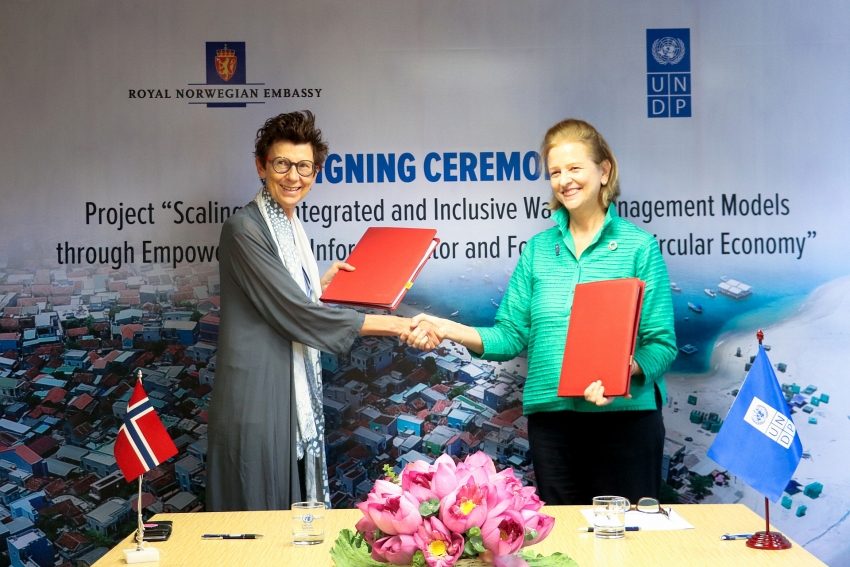New project scales up waste management models in Vietnam
This 3-year project is to deploy and test interventions, including direct support for informal waste workers, a management model in the fishery sector, and an ecosystem-level approach of value chains through the establishment of a material recovery facility, which will be piloted in the south-central province of Binh Dinh province’s Quy Nhon city.
 |
| Grete Lochen, Norwegian Ambassador to Vietnam (left), and Caitlin Wiesen, UNDP resident representative in Vietnam (right), signs a deal to implement a project on scaling up waste management models in the country |
Financed by the Norwegian government with a grant of $1.3 million, this project illustrates the strong commitment and extensive collaboration between Norway and the UNDP to tackle the growing issue of waste management in Vietnam and accelerate the transition to an inclusive circular economy.
It is the continuation of the first phase of the successful Norway-funded project “Scaling up a socialised model of domestic waste and plastic management”, aiming to develop integrated, green, and fair models to improve domestic waste and plastic management in five Vietnamese localities including Quang Ninh, Binh Duong, Binh Thuan, Binh Dinh, and Danang.
“We are very happy with the success of phase 1 of the project and to see the project being expanded. It is great that more local communities, particularly women, will take part in the common efforts to tackle plastic waste and build a circular economy. This is very important in the context of post-pandemic green recovery,” said Grete Lochen, Norwegian Ambassador to Vietnam. “Norway takes pride in our partnership with the UNDP in Vietnam and the Vietnamese government to take actions to combat plastic waste, build back greener, and leave no one behind.”
The 3-year project or "phase 2 project" responds to the need of scaling up local waste and recycling collection centres that respect environmental and social standards while engaging the informal sector in waste collection and segregation.
Through the project, community capacity for waste management will be enhanced when supported by an effective enabling environment and the adoption by municipalities and businesses of the circular economy principles.
“The UNDP is proud of our strong partnership with the Vietnamese government and the Norwegian government for accelerating circular economy. This new phase of the project will strengthen waste and plastic value chains in Quy Nhon by establishing a material recovery facility, a waste management model in the fishery sector, and piloting a portfolio of interventions to boost the livelihoods and inclusion of waste workers, particularly women,” said Caitlin Wiesen, UNDP resident representative in Vietnam.
According to her, building on the project’s establishment of the Vietnam Circular Economy Stakeholder Platform, phase 2 will continue to convene stakeholders, curate knowledge of the circular economy, foster exchanges and partnerships in line with the revised Law on Environmental Protection 2020 and the National Action Plan for Management of Marine Plastic Litter.
“We believe that by bringing together sustainable and inclusive waste management models, innovation and policy advice, the new phase of the project will further accelerate the achievement of a low-carbon and circular Vietnam,” Wiesen said.
The project comprises two mains outcomes: the first aims to implement sustainable models of waste management that increase livelihoods of waste workers (with a focus on informal women workers) while the second intends to scale up sustainable and inclusive waste management models and interventions through replication support, capacity development, and knowledge-sharing.
Overall the project will contribute to the achievement of the UN Sustainable Development Goals (SDGs), such as the prevention of marine plastic pollution, through increased engagement of the fishery, contributing to life below water (SDG14); poverty reduction (SDG1), through increased income and livelihood opportunities of women waste workers; promotion of women empowerment, through training and access to revolving funds contributing to gender equality (SDG5), contribution to environmental protection, through the implementation of sustainable value chains that reduce the amount of waste burned or landfilled, fostering the collecting and reuse of recyclable materials contributing to sustainable consumption and production (SDG12) and sustainable cities and communities (SDG11).What the stars mean:
★ Poor ★ ★ Promising ★★★ Good ★★★★ Very good ★★★★★ Exceptional
Related Contents
Latest News
More News
- Bac Ai Pumped Storage Hydropower Plant to enter peak construction phase (January 27, 2026 | 08:00)
- ASEAN could scale up sustainable aviation fuel by 2050 (January 24, 2026 | 10:19)
- 64,000 hectares of sea allocated for offshore wind surveys (January 22, 2026 | 20:23)
- EVN secures financing for Quang Trach II LNG power plant (January 17, 2026 | 15:55)
- PC1 teams up with DENZAI on regional wind projects (January 16, 2026 | 21:18)
- Innovation and ESG practices drive green transition in the digital era (January 16, 2026 | 16:51)
- Bac Ai hydropower works stay on track despite holiday period (January 16, 2026 | 16:19)
- Fugro extends MoU with PTSC G&S to support offshore wind growth (January 14, 2026 | 15:59)
- Pacifico Energy starts commercial operations at Sunpro Wind Farm in Mekong Delta (January 12, 2026 | 14:01)
- Honda launches electric two-wheeler, expands charging infrastructure (January 12, 2026 | 14:00)

 Tag:
Tag:
























 Mobile Version
Mobile Version